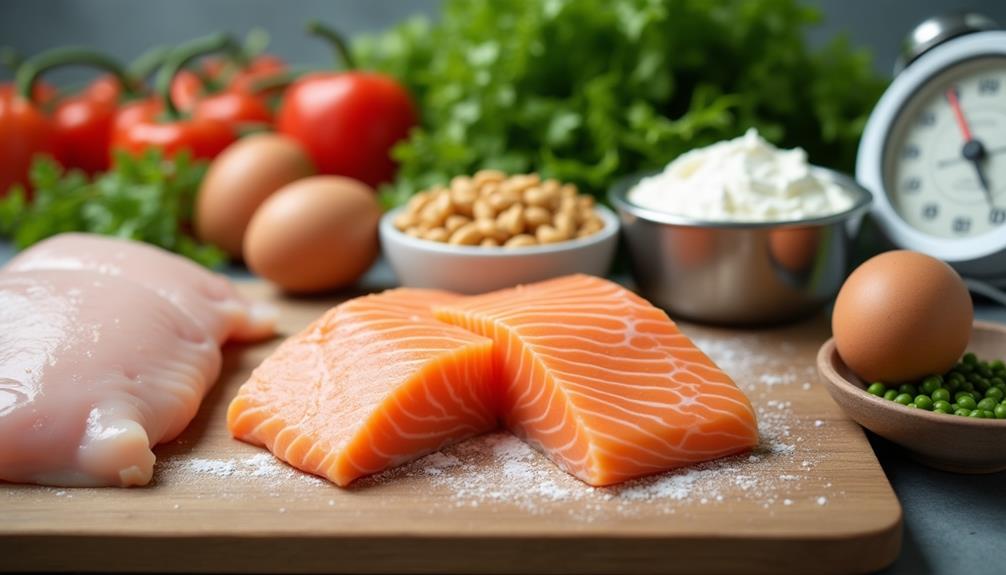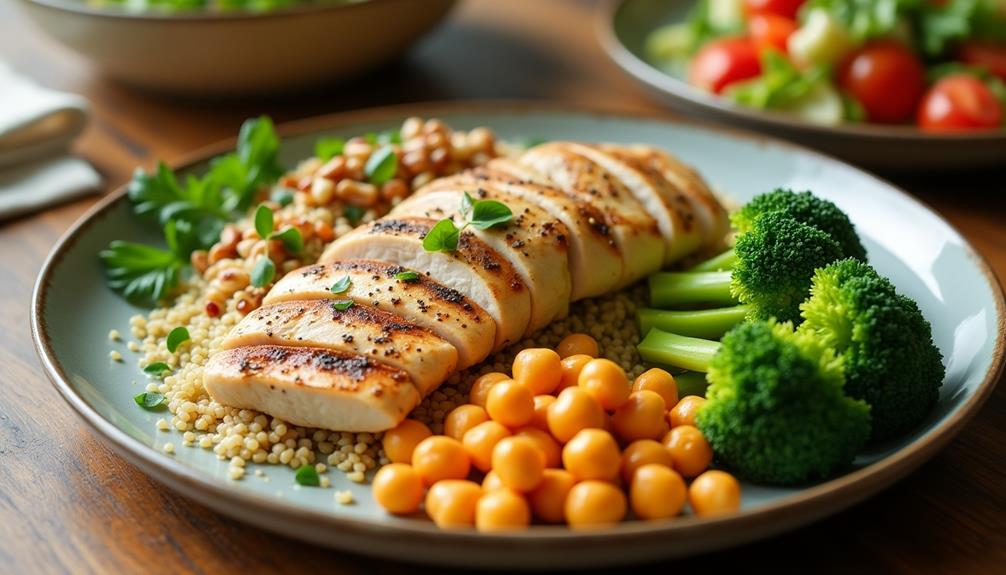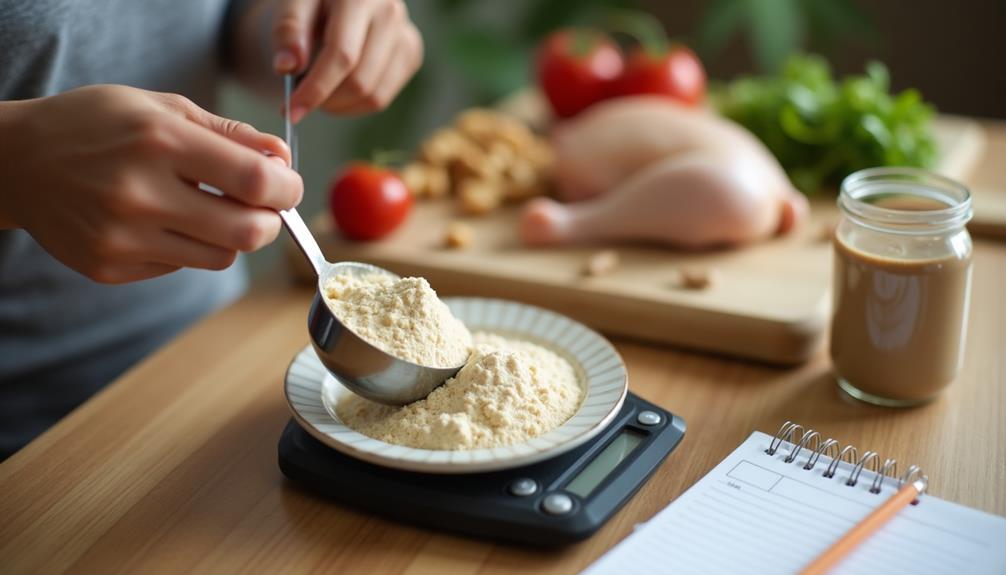To create an effective high protein diet for muscle gain, start by understanding your protein requirements. Aim for 1.6 to 2.2 grams of protein per kilogram of body weight daily. Choose high-quality sources like chicken, fish, and legumes. Plan balanced meals that include lean proteins, healthy fats, and complex carbs. Incorporate protein supplements, especially post-workout, for an extra boost. Track your protein intake using an app, and pay attention to nutrient timing. Stay hydrated and adjust your intake based on your activity level. Finally, monitor progress and make necessary adjustments for best results. There's more valuable information ahead!
Core Insights
- Calculate your daily protein needs based on your weight and activity level, aiming for 1.6 to 2.2 grams per kilogram of body weight.
- Include a variety of high-quality protein sources in every meal, such as chicken, fish, tofu, and legumes.
- Spread your protein intake evenly throughout the day to optimize muscle synthesis and recovery.
- Utilize protein supplements like whey protein for convenience, especially post-workout, to enhance your intake.
- Monitor your progress with food diaries or apps, adjusting meals as needed to meet your protein goals.
Understand Protein Requirements

To build muscle effectively, you need to grasp your protein requirements. Protein plays an essential role in muscle repair and growth. Generally, aim for about 1.6 to 2.2 grams of protein per kilogram of body weight each day. This range helps optimize muscle development while supporting your workouts. High-quality whey protein supplements can help you meet these requirements, offering 24-25g of protein per serving and often including beneficial BCAAs for muscle recovery.
Consider your activity level and training intensity when determining your needs. For instance, if you're lifting heavier weights or training more frequently, you might lean towards the higher end of that range.
Don't forget to spread your protein intake throughout the day. Consuming protein-rich meals and snacks every few hours can enhance muscle synthesis. By understanding and meeting your protein requirements, you're setting a strong foundation for your muscle gain journey.
Choose High-Quality Protein Sources

Here's a quick comparison of some excellent protein sources:
| Protein Source | Protein Content (per 100g) |
|---|---|
| Chicken Breast | 31g |
| Salmon | 25g |
| Lentils | 9g |
Plan Balanced Meals

Planning balanced meals is vital for maximizing muscle gain while following a high-protein diet. Start by incorporating a variety of food groups. Aim for lean proteins, healthy fats, and complex carbohydrates in every meal. For example, pair grilled chicken with quinoa and steamed broccoli. This combination not only provides protein but also essential nutrients. Consider adding organic protein powders to your diet for an extra boost of high-quality protein, especially if you're following a plant-based diet.
Next, consider portion sizes. You want enough protein to support muscle growth, but don't overlook carbs and fats, which fuel your workouts. A good rule of thumb is to fill half your plate with veggies, one quarter with protein, and one quarter with carbs.
Lastly, don't forget to hydrate. Water plays a vital role in muscle recovery. By planning balanced meals, you'll set yourself up for success on your muscle-building journey.
Incorporate Protein Supplements

Regularly incorporating protein supplements into your diet can greatly enhance your muscle gain efforts. These supplements, like protein powders and bars, provide a convenient way to boost your intake. They're especially useful post-workout when your muscles need protein for recovery. Lean muscle gain can be optimized by selecting protein powders specifically designed for this purpose, which often contain additional nutrients to support muscle growth and fat loss.
Choose a high-quality protein source, such as whey or plant-based options, to suit your dietary preferences. Mixing protein powder with smoothies or oatmeal can make for a tasty and nutritious meal.
Track Your Protein Intake

Tracking your protein intake is essential for maximizing your muscle gain. Start by determining your daily protein needs based on your body weight and activity level. A common recommendation is to consume about 1.6 to 2.2 grams of protein per kilogram of body weight.
Next, keep a food diary or use an app to log everything you eat. This helps you see how much protein you're actually getting. Don't forget to include protein sources like meat, fish, eggs, dairy, legumes, and nuts.
Regularly reviewing your intake can highlight areas for improvement. If you're falling short, consider adjusting your meals or incorporating more protein-rich snacks. By staying mindful of your protein consumption, you can effectively support your muscle-building goals.
Distribute Protein Throughout the Day

How can you optimize muscle gain through your protein consumption? Distributing protein evenly throughout the day is key. Aim for 20 to 30 grams of protein per meal and include snacks. This steady intake helps maintain muscle protein synthesis, promoting growth and recovery.
Start your day with a protein-rich breakfast, like eggs or Greek yogurt. For lunch, include lean meats, legumes, or tofu in your salad or sandwich. Don't skip post-workout nutrition; a protein shake can be effective.
Evening meals should also prioritize protein, with options like fish or chicken. By spacing your protein intake, you'll support your muscles better and avoid overwhelming your body. Stick to this routine, and you'll see improvements in your muscle gain journey.
Focus on Nutrient Timing

Timing your nutrient intake can greatly impact your muscle gain efforts. To optimize your results, focus on consuming protein around your workouts. Aim to eat a protein-rich meal or snack within 30 minutes before and after your training sessions. This timing helps provide your muscles with the amino acids they need for recovery and growth.
Additionally, consider spreading your meals throughout the day. This keeps your body in an anabolic state, which is essential for muscle development. Try to consume protein every three to four hours. By doing this, you'll guarantee a steady supply of nutrients, supporting continuous muscle repair and growth. Remember, effective nutrient timing can make a significant difference in reaching your muscle gain goals.
Stay Hydrated

While you focus on your protein intake, don't overlook the significance of staying hydrated. Hydration plays a pivotal role in muscle recovery and overall performance. When you're working out, your body loses fluids, which can lead to dehydration. This affects your strength, endurance, and even your muscle growth.
Aim to drink water consistently throughout the day, not just during workouts. A good rule of thumb is to consume at least half your body weight in ounces of water daily. If you're sweating heavily, consider adding electrolytes to replenish lost minerals.
Listen to your body; thirst is a sign you need to hydrate. Keeping your fluid levels balanced will help you maximize the benefits of your high protein diet and support your muscle gain goals effectively.
Adjust for Activity Levels

Adjusting your protein intake based on your activity levels is crucial for maximizing muscle gain. If you're hitting the gym hard, your body needs more protein to repair and grow muscle tissue. For those engaging in intense workouts, aim for 1.2 to 2.2 grams of protein per kilogram of body weight daily.
On lighter activity days or rest days, you can slightly reduce your protein intake without compromising your progress. Balance is key; listen to your body and adjust accordingly.
Consider your overall caloric needs and make sure you're fueling your body appropriately. Combine your protein sources wisely, opting for lean meats, dairy, legumes, and nuts. This approach supports muscle recovery and growth while aligning your diet with your activity levels.
Monitor Progress and Adjust

To effectively build muscle, you need to consistently monitor your progress and make adjustments as necessary. Start by tracking your workouts, nutrition, and body measurements. Use a simple journal or app to note your weight, muscle growth, and strength levels. This data helps you identify what's working and what isn't.
Every few weeks, reassess your protein intake and caloric needs based on your progress. If you're not seeing results, consider increasing your protein or adjusting your workout intensity. Don't hesitate to tweak your routine; muscle gain is a dynamic process. Remember, consistency is key, but flexibility also matters. Staying in tune with your body will guide you to make informed decisions for best muscle growth.
Frequently Asked Questions
Can I Gain Muscle on a Vegetarian High Protein Diet?
Yes, you can gain muscle on a vegetarian high protein diet. Focus on plant-based protein sources like legumes, tofu, and quinoa, and make sure you're consuming enough calories to support your muscle growth effectively.
How Do I Know if I'm Overconsuming Protein?
If protein's a double-edged sword, you'll know you're overconsuming by tracking your intake and monitoring symptoms like digestive issues or fatigue. Aim for balance; too much can burden your body rather than build it.
Are Protein Shakes Safe for Teenagers?
Yes, protein shakes can be safe for teenagers if they're used responsibly. It's important to choose high-quality products and make sure they don't replace whole foods. Always consult a healthcare professional before starting any supplement.
What Are the Signs of Protein Deficiency?
If you're protein deficient, you might notice fatigue, muscle weakness, slow recovery from injuries, hair loss, and weakened immunity. Paying attention to these signs can help you adjust your diet for better health.
Can High Protein Diets Affect Kidney Health?
When you immerse yourself in high protein diets, you might wonder about your kidneys. While they can handle increased protein, excessive amounts could strain them. Always balance your diet and listen to your body's signals for health.

